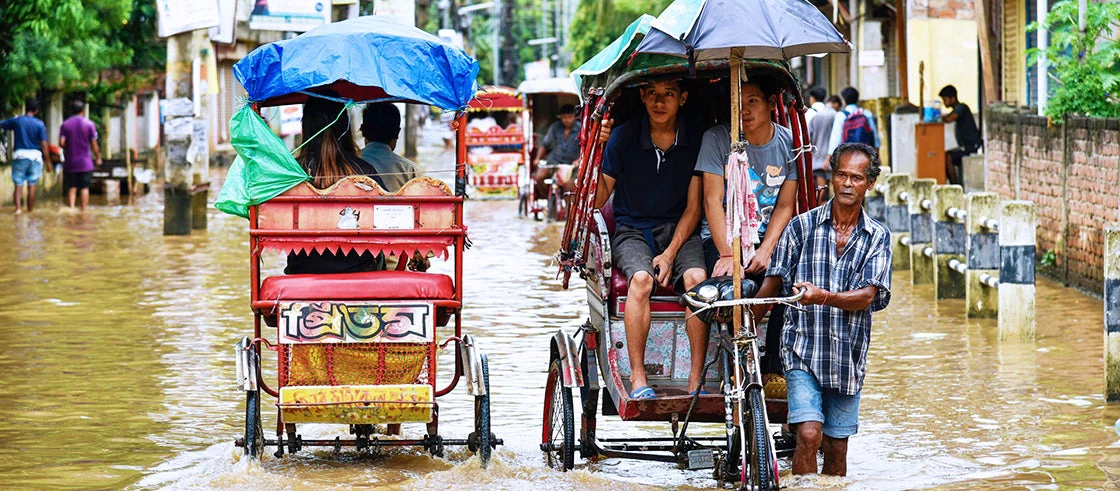 Waterlogged street after monsoon rainfall in Assam, India. Photo: Talukdar David / Shutterstock.com
Waterlogged street after monsoon rainfall in Assam, India. Photo: Talukdar David / Shutterstock.com
For developing economies with limited resources like in South Asia, regional cooperation to combat them has become even more urgent.
As South Asian governments fight to recover their coronavirus-ravaged economies, a new regional project will help make key sectors like agriculture and transport more resilient to shocks caused by climate change, extreme weather, and disasters.
The Climate Adaptation and Resilience project or CARE will provide access to detailed weather, water, and climate data and decision -making tools to help policymakers understand and plan for the economic impact of climate-induced natural disasters.
When we started preparing a regional initiative on climate six months ago, we didn’t realize how relevant it would be in the new COVID-19 world.
While the cost of COVID-19 is still being calculated, the costs of climate-related hazards are well documented. Flooding, drought, coastal erosion, and other climate-induced disasters affected nearly 1.7 billion people and caused $127 billion in damage from 1990 to 2019 , according to EM-DAT.
Flooding, drought, coastal erosion, and other climate-induced disasters affected nearly 1.7 billion people and caused $127 billion in damage from 1990 to 2019
A World Bank report, South Asia’s Hotspots, found that 800 million people in the region are at risk of declining incomes as rising temperatures and erratic rainfall cut crop yields, dry up water sources, and force people to leave their homes.
COVID-19 and climate-induced disasters may collide in South Asia when the annual monsoon season arrives in a few weeks. The same national, state and local emergency preparedness and response agencies that have been stretched thin by COVID-19 must now get ready for flooding, landslides and other hazards often unleashed by the monsoon’s torrential rain.
CARE is initially focusing on three countries that face the highest climate risk in the region – Bangladesh, Nepal, and Pakistan. But the project emphasizes the need for the entire region to work together on this common issue across the region.
A novel financing mechanism in the CARE project allows participation of two regional organizations, the Asian Disaster Preparedness Center (ADPC) and the Regional Integrated Multi-Hazard Early Warning System (RIMES). They are ideal partners to help countries trying to tackle common regional issues in South Asia, and their participation will spare governments from spending scarce financial resources as they cope with the COVID-19 fallout.
COVID-19 and climate-induced disasters may collide in South Asia when the annual monsoon season arrives in a few weeks
CARE will create an open Regional Resilience and Data Analytics Platform with data from all eight countries in the region. The platform will identify data gaps and make it easier for governments to incorporate climate-friendly practices when planning development or making budget and spending decisions. CARE will also support the development of regional guidelines and national standards to design roads, and other developmental activities in a climate smart manner
Encouraging innovation and disruptive technology is also essential. CARE includes $3.5 million in grants to promote innovation, provided by the trust fund, Program for Asia Resilience to Climate Change, which is administered by the World Bank and financed by the United Kingdom’s Department for International Development.
In this unprecedented time of national lockdowns, social distancing, working from home, and dwindling budgets, governments in South Asia continue to operate at the frontlines to protect people from both COVID-19 and climate shocks.
Kickstarting the CARE project now shows the commitment of South Asian governments and regional partners to emerge from this pandemic with a climate-resilient future.




Join the Conversation